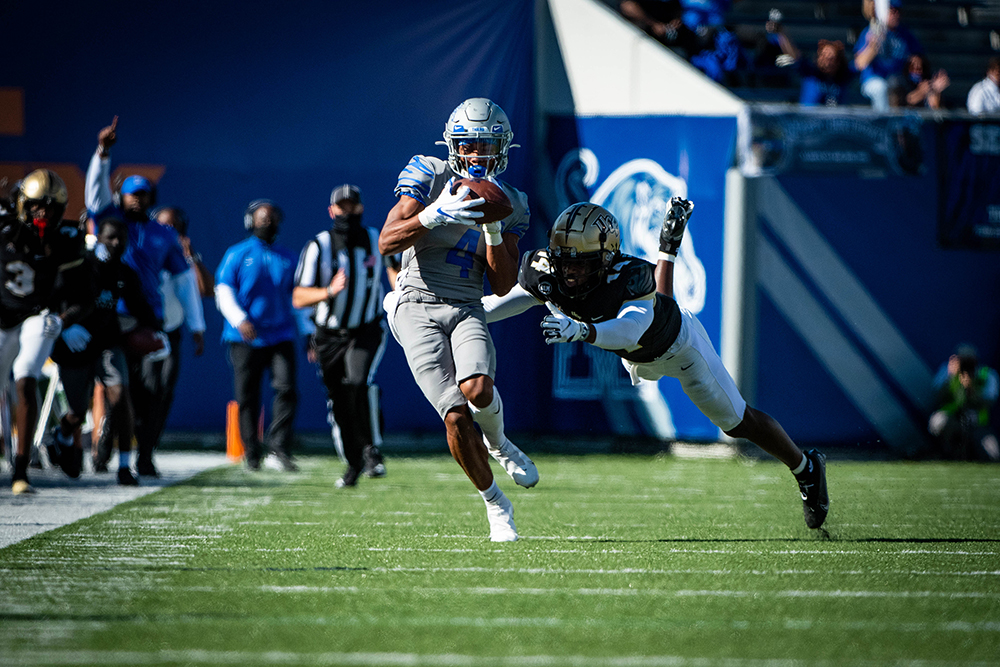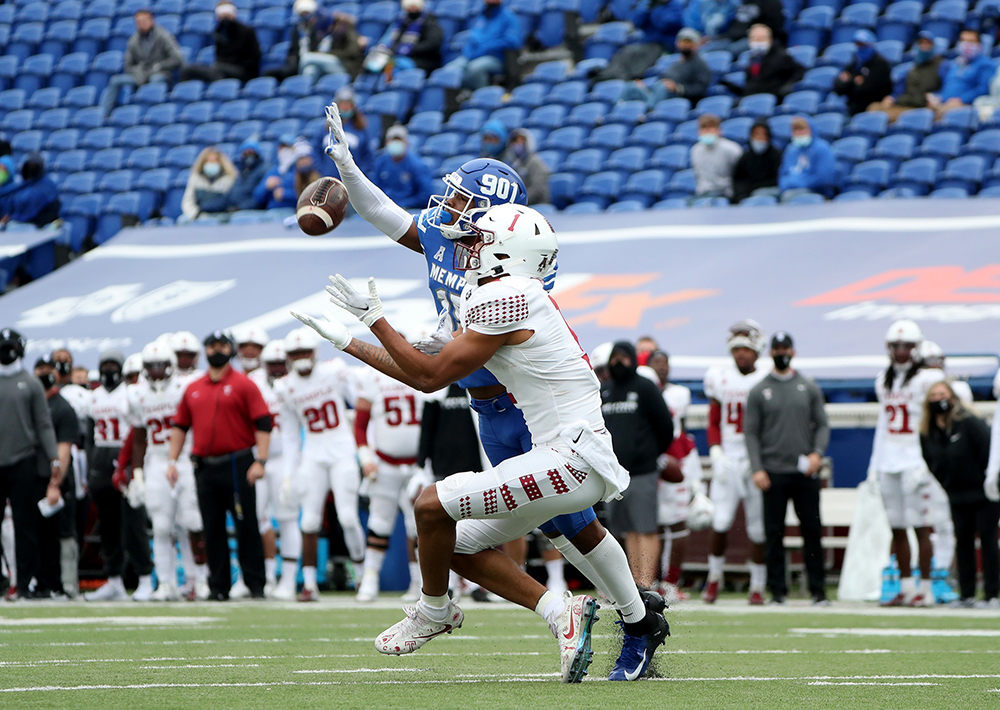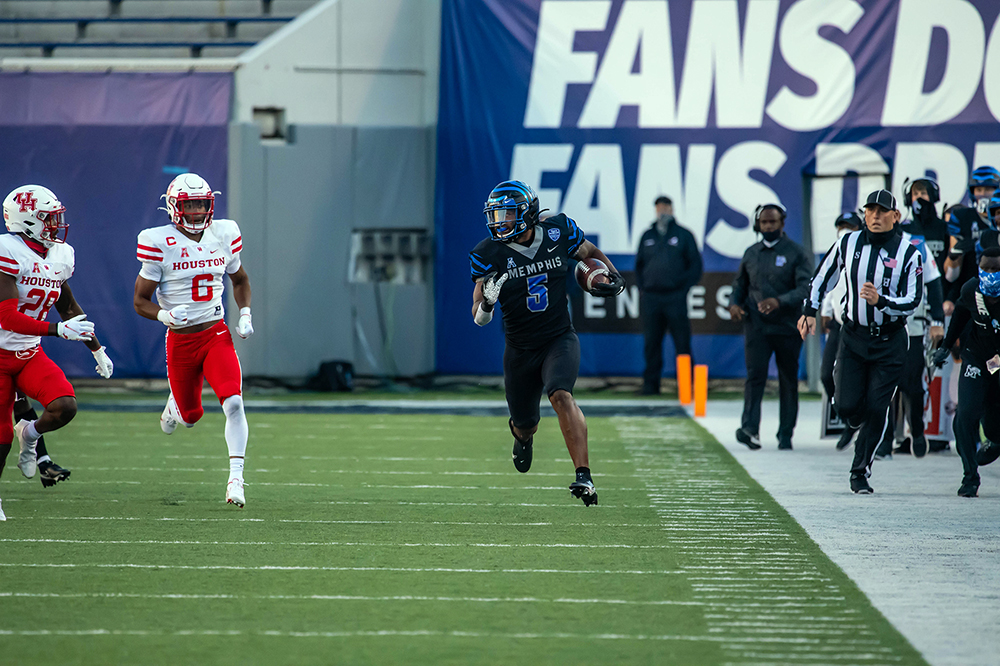No college football coach has begun his career in quite the way Ryan Silverfield has at the University of Memphis. His very first experience in command on the Tiger sideline occurred on December 28, 2019, in what happens to be the biggest game in the program’s history. Having been promoted from an assistant’s position to succeed Mike Norvell (who left for Florida State after Memphis won the American Athletic Conference championship game), Silverfield — then 39 years old — led the 15th-ranked Tigers against Penn State in the Cotton Bowl, one of the four most prestigious postseason games in the land. Memphis came up short (53-39) in an exciting game, but Silverfield had his platform for the next era of the program’s growth.
Not quite three months later, Silverfield’s program essentially shut down as the coronavirus pandemic took hold of organized sports all over the globe. The young head coach would learn the ropes under conditions unlike any of his predecessors — or any of his competition — had experienced before.
“Who would ever have thought my first three months on the job would be the easiest,” wonders Silverfield. “It became a totally different deal [during the pandemic] than when I took the job. It was a new era for Memphis football, and I felt like we had some momentum going in. Our kids left for spring break, and we ended up having about a three-month spring break. Anytime you’re trying to get a staff together, to learn from each other and build relationships, it’s never easy. Doing it via Zoom, not being able to be around [the players] … so much of college football is about relationships. You’re dealing with 125 17- to 22-year-olds. We need to be there for them in everything we do. Our administration handled it the right way, and our kids persevered. It was a trying season, in more ways than one. The opt-outs [players choosing not to play under the pandemic restrictions], not knowing your schedule, getting tested [for Covid-19]. I’m proud of those who persevered and came out on top. Credit to all those around me. You want to forget, but I’ll always remember a season that was unique to me and everyone else.”

Even with the stifling restrictions, Silverfield’s first season was a success. The Tigers went 8-3 and won the program’s first bowl game since 2014 (a victory over Florida Atlantic University in the Montgomery Bowl). But Memphis missed out on the AAC championship game for the first time in four seasons, so there’s ground to gain (or regain) in 2021.
Entering his second season, Silverfield has a closer-to-normal football atmosphere around him. (As camp opened in August, players who had not been vaccinated against the coronavirus were required to be tested for Covid-19. Near the end of the month, Silverfield said more than 80 percent of the Tiger roster has been vaccinated, with the goal being 100 percent.) And part of “normal” for college football coaches every summer is the task of addressing significant departures. Former quarterback Brady White leaves the most significant void, having won the most games (28) and passed for the most yardage (10,690) and touchdowns (90) among all signal-callers in Tiger history. Also gone are placekicker Riley Patterson (second in career scoring for the U of M with 432 points) and a trio of impact-making transfers: offensive lineman Obinna Eze (to TCU), wide receiver Tahj Washington (to USC), and defensive back T.J. Carter (to TCU).

But there is returning star power for Memphis. If you enjoy “watch lists” — those preseason projections of which players will contend for which postseason awards — you’ll need a deep breath before reciting the Tigers’ candidates: Calvin Austin III (Biletnikoff Award for outstanding receiver and Maxwell Award for most outstanding player), Sean Dykes (John Mackey Award for best tight end), Quindell Johnson (Jim Thorpe Award for best defensive back and Chuck Bednarik Award for outstanding defensive player), and Dylan Parham (Outland Trophy for best interior lineman).
These kinds of preseason nods tend to go to programs that have enjoyed seven straight winning seasons, a pair of AAC titles, and three Top-25 finishes (in 2014, ’17, and ’19). The Tigers enter the 2021 campaign on a 15-game home winning streak (fifth in the nation), the kind of utter dominance expected of blue bloods in Tuscaloosa, Alabama, or Columbus, Ohio. Since 2014, the Tigers are 41-5 at the Liberty Bowl. (For perspective, Memphis has won more home games over the last seven seasons than the program did the previous 14.) So yes, expectations are high. Again.

Just Watch!
There’s some irony to the watch lists, as you won’t find a Tiger among candidates for the Davey O’Brien Award, given annually to the country’s top quarterback. Having suited up Paxton Lynch (2013-15), Riley Ferguson (2016-17), and White (2018-20) over the last eight years, Memphis has found not just stability behind center, but profound, record-breaking success. Silverfield opened camp in August by declaring any one of four quarterbacks capable of continuing this unprecedented stretch: Keilon Brown (a dual-threat redshirt freshman from Zachary, Louisiana), Grant Gunnell (a junior transfer from the University of Arizona), Seth Henigan (a freshman from Denton, Texas), and Peter Parrish (a sophomore transfer from LSU).
Despite nursing an injury through much of training camp, Gunnell fits the picture — and brings the most experience — for Saturday’s opener at the Liberty Bowl. [Editor’s note: Silverfield had not named the starter at press time.] Based on his size (6’6”, 228 lbs.), Gunnell fits the prototype for a drop-back gunslinger, the kind Memphis has gotten used to over the last decade. As for credentials, Gunnell shattered state records as a high school player in Houston, passing for 16,108 yards and 195 touchdowns over four years. In his two seasons at Arizona, Gunnell played in 12 games, completed 66 percent of his passes and connected for 15 touchdowns (with only three interceptions).
“First and foremost, it’s intelligence and accuracy,” says Silverfield, in emphasizing the qualities he wants to see from his quarterback on a weekly basis. “He needs to display leadership and arm strength and be athletic enough to get you out of trouble. Can he handle the offense? Is he a quick thinker, able to process information?”
Silverfield chuckles when asked if the Tiger offense will remain a run-first attack. “I’m an offensive-line guy,” he says. “We’ll base it on personnel. Brady White was a great drop-back passer, so there were times when we had to lean on the pass. We’ve also had NFL-caliber running backs recently, so it made sense to run first. A lot of it is what the defense gives us.”
In Austin and Dykes, the Memphis quarterback — whoever he might be — will have a pair of veteran game-breakers to target. A former walk-on from Harding Academy of Memphis, Austin caught 63 passes for 1,063 yards and 11 touchdowns in 2020, filling the void left by Damonte Coxie, who opted out early in the season. Dykes hauled in 47 passes for 581 yards and seven touchdowns and already owns the Tiger career records for catches (80) and receiving yards (1,169) by a tight end. The top returning ball-carrier is Rodrigues “Dreke” Clark (561 yards last year), but Marquavius Weaver (from Bartlett High School), Kylan Watkins (Whitehaven), Cameron Fleming, and Brandon Thomas give the running back position every bit as much depth — or question marks — as quarterback. “We started seven different running backs last year,” notes Silverfield. “Probably not where you want to be, but our bell cow [Kenneth Gainwell] opted out five days before the first game. We’ve got to figure out who that guy is [this season].”
High Expectations for Tiger Talent
The Tigers have become one of the top-scoring programs in the country, with averages (points per game) the last five seasons of 38.8, 45.5, 42.9, 40.4, and 31.0. Conversely, the Memphis defense has allowed its share of points, with averages (since 2016) of 28.8, 32.5, 31.9, 26.4, and 27.9 last season under first-year defensive coordinator Mike MacIntyre. A pair of ugly losses at Cincinnati (49-10) and Tulane (35-21) exposed the Tiger defense in ways that even a prolific offense couldn’t hide. This year’s defense will be led by a pair of preseason all-conference selections, first-team lineman Morris Joseph (seven quarterback sacks in 2020) and second-team safety Quindell Johnson. As a sophomore last season, Johnson led the AAC with 60 solo tackles, pulled down three interceptions, forced two fumbles, and recovered another.
“Quindell is an extremely smart football player,” says MacIntyre. “He can cap the defense and see what’s going on with the offenses [we face]. Not only does he have the ability to make plays on interceptions, but running the alley, making checks, and just his great football savvy.”
As high as the expectations have become for the Tigers here in the Mid-South, the program has drifted back into a middle tier when measured nationally. Only one AAC team (Cincinnati) cracked the AP’s preseason Top 25, Memphis not so much as receiving a vote. As for their conference standing, the Tigers are projected to finish fifth in the AAC by media pollsters, behind the Bearcats, UCF, SMU, and Houston.
Silverfield takes the stance of a coach with many more years behind him when it comes to such prognosticating, or circling games on the Tiger schedule. No one has won (or lost) a game yet, so paper standings in August mean zilch. And yes, he’s circled a game on the Memphis schedule: the opener this Saturday against Nicholls State. (September 18th might be highlighted on a few Memphis refrigerators. Mississippi State visits the Liberty Bowl for the first time since 2011. The Tigers haven’t beaten the Bulldogs since 1993 and not since 1988 on their home turf.)
“This is a winning program now,” stresses Silverfield. “The city embraces Memphis Tiger football. The love for the players grows, year in and year out. It’s what makes this place unique. Our players appreciate the support they get from the city. We know what a home-field advantage we have.”
Silverfield learned much about himself over his rookie year — that unique rookie year — as a head coach. “As a first-year coach, you want to control everything,” he says. “Nothing kicked me in the teeth like the pandemic telling me, ‘Hey, you have very little control over everything.’ I control what I can. But every day there is going to be something, and I have to deal with it the right way, to have patience but act swiftly. I’m still gonna coach hard and hold people accountable. But when issues arise, I better be level-headed in order to figure things out.”
2021 TIGER FOOTBALL SCHEDULE
• September 4 (6 p.m.) — Nicholls State
• September 11 (6 p.m.) — at Arkansas State
• September 18 (3 p.m.) — Mississippi State
• September 25 — UTSA
• October 2 (11 a.m.) — at Temple
• October 9 — at Tulsa
• October 14 (Thursday, 6:30 p.m.) — Navy
• October 22 (Friday, 6 p.m.) — at UCF
• November 6 — SMU
• November 13 — East Carolina
• November 19 (Friday, 8 p.m.) — at Houston
• November 26 (Friday) or Nov. 27 — Tulane
